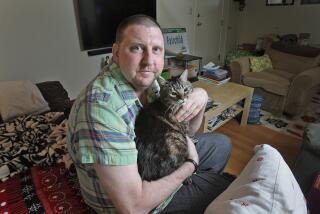The Dutch Way of Death Allows for Euthanasia
- Share via
AMSTERDAM — The Netherlands, staid and commercial, would seem to be one of the least likely nations to experiment with that central item of human eschatology--an easeful death. And yet this year, by reliable estimates, some 6,000 people in Holland will be put to rest forever by lethal injections in semi-official circumstances.
The Dutch way of death for the hopelessly ill has been an open secret in Europe for several decades, attracting patients well-off enough to make the trip and fulfill the medical requirements. Doctors, too, make pilgrimages to see what is done at the leading edge of the eternal debate. With the increased sophistication of means of keeping people alive, the early experience in Holland is becoming a benchmark for attitudes and legislation. Each European country, followed by the rest of the developed world, is having to face the problem.
This year New York became the first American state to pass a law that ends a few of the armory of medical deceits that surround the terminally ill. Under the law signed by Gov. Mario M. Cuomo, hospitals will be required to withhold emergency cardiopulmonary resuscitation from patients who refuse it. It also gives civil and criminal protection to health professionals who obey an order made in advance by a patient who wants to forgo emergency resuscitation if there is no likelihood of recovery. The law also allows a surrogate to make the decision if a patient is incompetent and hopelessly ill.
In Holland, a pragmatic country, the law is not as unwieldy because it depends more on practice than codification. What Dutch doctors do is determined by a de facto procedure established by the doctors themselves and abetted by court decisions. In this procedure, the patient must be fully conscious, must have time to think about the decision and must be seconded by medical and spiritual advisers prepared to disagree. The patient’s signed authorization must be in hand before the mercy killing is carried out.
Consultation with family members is constant, and there is a last meeting where relatives, the doctor and the patient take part, consoling one another. The final injection consists of a drug to induce sleep and another to bring death.
Much of the procedure is technically against Netherlands law, which still forbids anyone to take the life of another person even after a “serious and explicit request.” But the court precedents, beginning in 1972, and the Dutch way of tacit compromise have made the procedure fairly standard. Sometimes the main decision a terminally ill patient has to make is whether the end is at home or in the hospital. While politicians in the Netherlands still debate the issue (the government is a coalition of Christian Democrats, who oppose euthanasia, and Liberals, who favor legalization) the mood of the people is clear. Public opinion polls consistently show a more than 60% majority favors a decent death for those who are ill and ask for an end to suffering.
Opponents of euthanasia point to the Dutch experience with drugs and pornography; in both areas the country has probably been the most liberal in Europe. A terrifying scandal this year involving children has called into question the laissez-faire attitude about pornography. And the government this summer has been tightening control of the drug traffic, permitted to flourish in places like Amsterdam despite laws against it. While coffee shops still offer hashish, anyone who sells in bulk, or to minors or who promotes his wares aggressively is liable to arrest. Dealers in heroin or cocaine, while prevalent, remain outside the law.
The Dutch minister of justice attributed the drug crackdown to the planned expansion of the European Economic Community in 1992. By that date there will be a true Common Market for the 12 member nations, without customs or immigration barriers. Holland could not then pursue its own liberal policies, the minister said, but would instead have to come more into line with its EC partners.
It might be the same with euthanasia. No other EC country appears to be prepared to go nearly as far as Holland, and its closest neighbors--Belgium and West Germany--are led by Roman Catholic political parties. In West Germany, for example, the Catholic church is the second largest employer and 50% of the people are declared Catholics. A change in the laws against euthanasia, like easing restrictions on abortion, is politically unlikely.
Nonetheless, in Holland the practice goes on. The latest wave of patients seeking what the Dutch call “the mild death” have acquired immune deficiency syndrome. The head of the AIDS unit at Amsterdam’s University Medical Center said recently that half of his patients inquired about euthanasia when they learned they had the incurable disease. He estimated that at least 12 patients had been given lethal injections this year. Another source said that a majority of the country’s 130 recorded AIDS death had been sped by medical intervention.
More to Read
Sign up for Essential California
The most important California stories and recommendations in your inbox every morning.
You may occasionally receive promotional content from the Los Angeles Times.












